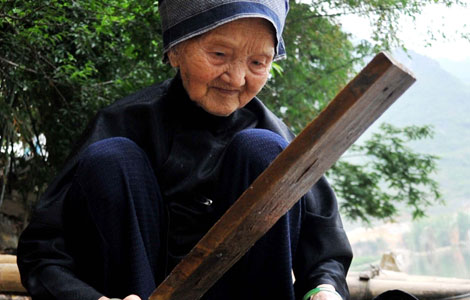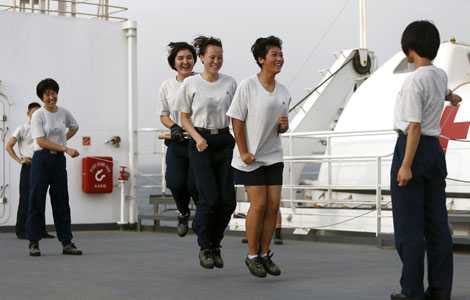Beijing clean air action plan well-received
Updated: 2013-09-05 20:46
(Xinhua)
|
|||||||||||
BEIJING - The measures in the clean air action plan and tough stance Beijing has taken toward tackling air pollution have received positive feedback from environmental groups and the public.
Beijing pledged to reduce PM2.5 density by a minimum of 25 percent by 2017 in a five-year plan unveiled Monday, which includes tough measures on cutting vehicle emissions and curbing industrial pollution.
The city vowed to restrict the total number of vehicles to 6 million by 2017 by allowing fewer car registrations beginning next year. The city is considering levying congestion fees and planning to spend big on public transportation in order to reduce vehicle use.
Beijing also pledged to close companies causing pollution, toughen environmental impact assessments for new projects, push forward water and power pricing reforms to raise costs for heavy polluters, and raise or levy new fees on emissions of major pollutants.
Tackling vehicle exhaust pollution is a priority for Beijing in its fight against severe air pollution, said Changhua Wu, Greater China Director of the Climate Group.
The Climate Group, founded in 2004, is an independent, non-profit organization with operations in China, India, Europe and North America.
"I applaud the recent intensive actions taken by the municipal government to adopt a more integrated approach to tackle the PM 2.5 challenge," Wu said.
"In the previous decades we have witnessed the path Beijing has taken: from a bicycle-friendly city to a traffic-jammed city with a rapidly rising air pollution concern. The specific targets, if taken seriously, are expected to turn this situation around," Wu said.
The city also should come up with a plan to encourage a transport-, bicycle-, and pedestrian-friendly model to turn Beijing into a leading environmentally friendly city, said Wu.
The measures also raised hopes for many among the general public who long for cleaner air and bluer skies.
"Only by strictly carrying out the actions can we have a brighter future," said a microblogger under the name of "Woailinzhihui" on the popular Twitter-like Sina Weibo platform.
Others suggest authorities take more measures, including offering subsidies for clean-energy vehicle purchases, reducing car use by government agencies, and collaborating to fight pollution in neighboring regions.
Beijing is surrounded by heavy chemical industrial bases using iron and steel, building materials, thermal power, and cement, which contribute significantly to the capital city's air pollution.
The severe smog that often shrouds the city is a major source of public complaints and also damages the city's image. Many people, particularly foreigners, have chosen to move to other cities or even reject job offers in the city out of health concerns.
Tackling air pollution is an arduous task and needs a lot of effort for a long period of time, said Michael Alexis, a Canadian lawyer in Beijing.
Alexis even suggested that the government subsidize families for "air farms" to encourage people who grow plants to convert carbon dioxide.
Air pollution is a byproduct of rapid economic growth and it is time to adjust industrial structures and energy use and transform economic growth modes, said one foreign professional in Beijing.
The government should evaluate local officials' performances based on their environmental records rather than on economic growth rates, said Florian Kessler, general manager of German Chamber of Commerce in China.
Related Stories
Beijing urged to take lead in air pollution treatment 2013-09-03 18:34
Beijing to cut car registrations in 2014 2013-09-03 16:04
Meteorological center launches air pollution forecasts 2013-09-03 09:36
Detailed regulation needed to better curb air pollution 2013-09-02 23:04
China launches air pollution forecasts 2013-09-02 18:31
Beijing vows to reduce PM 2.5 density by 25% 2013-09-02 13:25
Today's Top News
Japan to test 'ice wall' for leaking water
Xi calls for closer G20 ties to boost world economy
18-year-old panda conceives triplets
Films aim for success abroad
Students find low-budget education abroad
Commuter aviation in near future
Ex-railway deputy chief pleads guilty
Brazil asks for apology from US
Hot Topics
Lunar probe , China growth forecasts, Emission rules get tougher, China seen through 'colored lens', International board,
Editor's Picks

|

|

|

|

|

|





